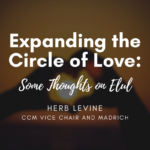 Our ancestors gave us the gift of Elul, a month to take stock of our lives in preparation for the great reckoning of Rosh HaShanah and Yom Kippur. We Mussar students take stock on a daily basis. Our Cheshbon HaNefesh is a daily accounting of moments when we could have done better in bearing the other as our burden. So what does the gift of Elul offer the Mussar student that is different than what comes from a daily Cheshbon?
Our ancestors gave us the gift of Elul, a month to take stock of our lives in preparation for the great reckoning of Rosh HaShanah and Yom Kippur. We Mussar students take stock on a daily basis. Our Cheshbon HaNefesh is a daily accounting of moments when we could have done better in bearing the other as our burden. So what does the gift of Elul offer the Mussar student that is different than what comes from a daily Cheshbon?
This year, the Center for Contemporary Mussar sought to create greater collective awareness in our community around Elul by hosting a series of webinars, “Preparing Our Souls for the High Holy Days.” Many of you reading this will have participated in one or more of the sessions that we have offered this past month, attended by more than two hundred people. Rabbi Stone initiated the series by proposing that each of us has a destiny for the coming year and that the month of Elul gives us a head start in finding our path to it. Through an analysis of the U’N’taneh Tokef prayer, he went on to amplify the idea so central to all his teachings: that the religious language we have inherited needs to be taken metaphorically, lest we make an idol out of any particular image of God.
The Rabbis who serve on CCM’s Rabbinic Advisory Council, all of whom studied with Rabbi Stone, further developed this theme and the themes of the U’n’taneh Tokef prayer in the following weeks. Rabbi Rachel Bovitz showed us how Maimonides’s stages of repentance can be aligned with the protocols we have developed for working on middot, putting us in good position to make the most of the season’s focus on T’shuvah. Rabbi Richard Camras offered a view of prayer centered around the idea that our words are not intended just for a supernatural Other, but also for ourselves, as we use the rubrics of the service to make a prayerful Cheshbon of who we have been and who we are called to be. In speaking about Tz’dakah, Rabbi Harold Kravitz focused on our motivations for giving. He distinguished between the connotations of Tz’dakah as righteousness and justice, urging us to purge ourselves of self-serving feelings of doing good and instead to reflect on the needs of those who receive to be treated justly. At this writing, we await Rabbi Joshua Boettiger’s talk on the part that we ourselves play in reducing “the severity of the decree” and a concluding session with Rabbi Stone two nights before Rosh HaShanah.
I would like to add one more thought about this month of Elul. Our rabbinic forebears saw Elul hinted at in the verse from Song of Songs, “I am my beloved’s and my beloved is in mine.” In Hebrew the words are, “Ani L’Dodi V’odi Li,” which spells Elul through the first letters of each word (v and u both representing the letter Vav). The rabbis of antiquity allegorized Song of Songs as depicting the love affair between God and Israel. So they saw the period of Elul as a time of betrothal, Rosh HaShanah as the signing of the engagement contract, Yom Kippur as the day of fasting that precedes a wedding and the Festival of Sukkot, the consummation, as we dwell with our divine beloved under the shelter of the Sukkah, toast and bless our divine partner for seven days, then dance seven great circles to celebrate our marriage to God and God’s Torah at the festivities of Simchat Torah.
This metaphor begets another when we juxtapose it to the verse so key to all our Mussar work, “Love your neighbor as yourself.” Our neighbor is also our beloved, just as God is said to be. What does it take to stretch ourselves to incorporate our neighbor, not just our closest other, in our circle of love?
For me, that stretching begins when I remember to see myself as beloved. We can all take the time to remember the people in our lives who have loved and cared for us. Then we will see that our neighbor also has been loved and cared for by many people. The chain of love is as old as humanity and perhaps, even older, going back to our primate ancestors’ care for their offspring and troop. Much depends on our capacity to pay that love forward by loving others, even if those others seem at first or even second glance utterly alien to us.
So as we find our way back toward a loving, compassionate forgiving God at this season, I believe we will see the fruit of that relationship in our ability to make many others our beloveds, for that is where all the metaphors of these Days of Awe point.
